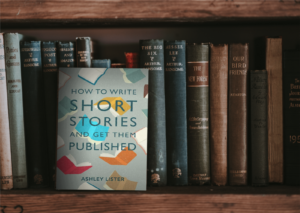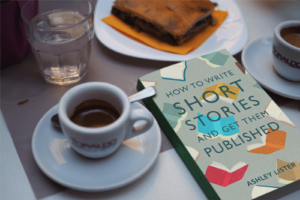By Ashley Lister
Today I’m the bearer of sad news. The Apostrophe Protection Society has shut down with the bleak explanation that ‘ignorance has won’.
I was going to use this spot to talk about my new book, available in a little under two weeks, How to Write Short Stories and Get Them Publ ished. It’s a fantastic little book that goes into the mechanics of writing short stories. The book is based on knowledge and experience I’ve accrued from fifteen years of teaching creative writing, and from twenty-five years of being a published author, and from the research I conducted whilst acquiring my PhD in creative writing. If you want to write short fiction, I want you to buy a copy of the book. Here’s a picture of it, if you’re curious.
ished. It’s a fantastic little book that goes into the mechanics of writing short stories. The book is based on knowledge and experience I’ve accrued from fifteen years of teaching creative writing, and from twenty-five years of being a published author, and from the research I conducted whilst acquiring my PhD in creative writing. If you want to write short fiction, I want you to buy a copy of the book. Here’s a picture of it, if you’re curious.
But, rather than promoting my personal interests, because I know how important punctuation is to clarity of communication, I wanted to spend some time talking about punctuation and the closure of the Apostrophe Protection Society.
Punctuation is an essential aspect of the written word that lends clarity to communication. This is important because, during spoken communication, we can use a variety of prosodic features, such as pausing, increasing or decreasing the speed of our speech, making our voices louder to show anger, or finishing a sentence on a rising intonation to suggest a question. These nuances, which we take for granted with the spoken word, are difficult to replicate in written communication.
Take, for example, the old internet joke about punctuation being the difference between: ‘I helped my Uncle Jack off a horse’, and: ‘I helped my uncle jack off a horse’. Similar amusement is gleaned from the need for a comma in the sentence, ‘Let’s eat Grandma,’ or the oxford comma needed for the newspaper article which described the content of a programme as presenter Peter Ustinov having encounters, ‘with Nelson Mandela, an 800-year-old demigod and a dildo collector.’
Punctuation provides the signposts readers need to understand the subtle inflections we take for granted on hearing the spoken word. Apostrophes are a very important aspect of that understanding. For example, if we take the unpunctuated sentence, ‘The boys books’, the reader doesn’t know if the books belong to a single boy or several of them. Admittedly, this is not the sort of world-changing sentence that will make everyone think, ‘We need more punctuation’, but it is the sort of sentence that might cause confusion and drag your reader out of the story you’re writing.
This is a link to the article on the closure of the Apostrophe Protection Society. I would disagree with the article’s conclusion that ‘ignorance has won’, even though the current political climate would suggest that ignorance is a way of life for many voters and their party leaders. Personally, I try to keep on top of apostrophe usage and will happily photograph and tweet offending examples, making sure the responsible companies have a chance to see that their errors have been noted.
But, I know, what I’m doing is a small contribution to a very large problem. Fortunately, there are a couple of pages discussing the need for appropriate punctuation in my forthcoming book: How to Write Short Stories and Get Them Published. Perhaps that might help.



Well, the Apostrophe Protection Society may have given up, but I never will. I wonder with them giving up, will there be a resistance splinter group. The Apostrophe Underground operating under cover of darkness, tirelessly fight the most egregious grammar crimes, erasing and adding, wherever necessary, e.g. “Carrot’s On Sale” and “Mens Shoes 50% Off” (the latter possibly leading to funny walks).
Rose 😉 Proud Member of the Apostrophe Underground
Rose – I’m happy to join the militia wing of the Apostrophe Underground and fight alongside you. A couple of years back my wife pointed out a bottle of port in a shop that was labelled with the brand name ‘Taylors’. I said I didn’t want it because it was missing the apostrophe. She said I wouldn’t be able to taste the apostrophe to which I said, “Of course I won’t be able to taste it, because they’ve not put one there.”
One thing I’ve learned in my study of several foreign languages (most recently, Chinese) is that if there’s no textual way to signal a distinction in meaning, that distinction might as well not exist.
Punctuation is one way that English signals such distinctions. Without the apostrophe, will these distinctions disappear? Will we really not care whether the books belong to one boy or several? Will common parlance evolve to include additional helping words or phrases to compensate for the lack of the apostrophe? In Chinese, there is no real past tense. Instead, almost every sentence will include an adverbial time phrase to help clarify the temporal context.
Or will we simply be content with muddy meanings and learn to live with misunderstandings?
Lisabet, perhaps we will be the last generation (or dare I say it, the last *educated* generation) to care.
The woeful abuse and misuse of punctuation (and grammar) I’ve noticed, in recent years, comes at a time when clear communication, and the *intent* of that communication, would seem to be more important than ever, given the amount of it that is done by text and email. People become offended and outraged over some twitter or tweet (I assume I’m using those terms properly, seeing as how I use neither of those communication modes), because the meaning was misinterpreted. Even in emails, which allow for longer and more detailed communication (at which I excel, often to a reader’s chagrin), the *tone* is sometimes misinterpreted.
I’ve used asterisks, in the above paragraph, to denote emphasis, for instance, to better convey how I would be saying the words, if I were speaking to someone face to face.
I’ve always believed that written communication should be as clear as possible, so that the intent of it is open to as *little* misinterpretation as possible.
Too much of this apparent lack of interest in proper punctuation (and grammar, too, but that’s another discussion) seems, at least to me, to stem from voluntary ignorance. The correct information is there, and is still taught to some degree, but if people choose to ignore the basics, or not pursue the subject a little further, then they are remaining ignorant on purpose.
Too many people just don’t *care* how they punctuate. I get that *some* people just aren’t good at punctuation, in the same way that I’m not good at higher math, but higher math isn’t basics. In my view, not knowing where to insert proper punctuation is the equivalent of not knowing basic arithmetic symbols. I do appreciate that there are younger people, with whom I work, who still count on other people, like me, to proofread and correct their written work. It’s part of the job I get paid to do, and I’m happy for that. I’m happy that younger professionals respect the knowledge that makes them look more professional when they create text that must be read by colleagues, or the public at large.
If there ever comes a time, when virtually no one cares about punctuation, I’ll probably be dead by then, but for now, I’ll just keep on trying to punctuate my text the way I was taught to do — i.e. correctly.
(I still appreciate being corrected, when I punctuate incorrectly, no matter how embarrassing it is. Sort of like when I catch my own typos *after* I’ve sent an email.)
I can tell you… a lot of Gen-Xers still care!!!
Lisabet & Rose
I’m a firm believer in the conscientious use of punctuation. Punctuation is the only way we can imbibe the nuances of speech into the anodyne medium of written text. Admittedly, an emoji wink 😉 or frown 🙁 can give a very clear indication of a speaker’s general intent, but these are akin to neon highlighters when regular punctuation is more like the subtle depths perceived in a watercolour painting.
Ash
I’m still in mourning, and it’s been nearly two weeks!! Thank you for mourning with me.
and that new book looks fab 🙂